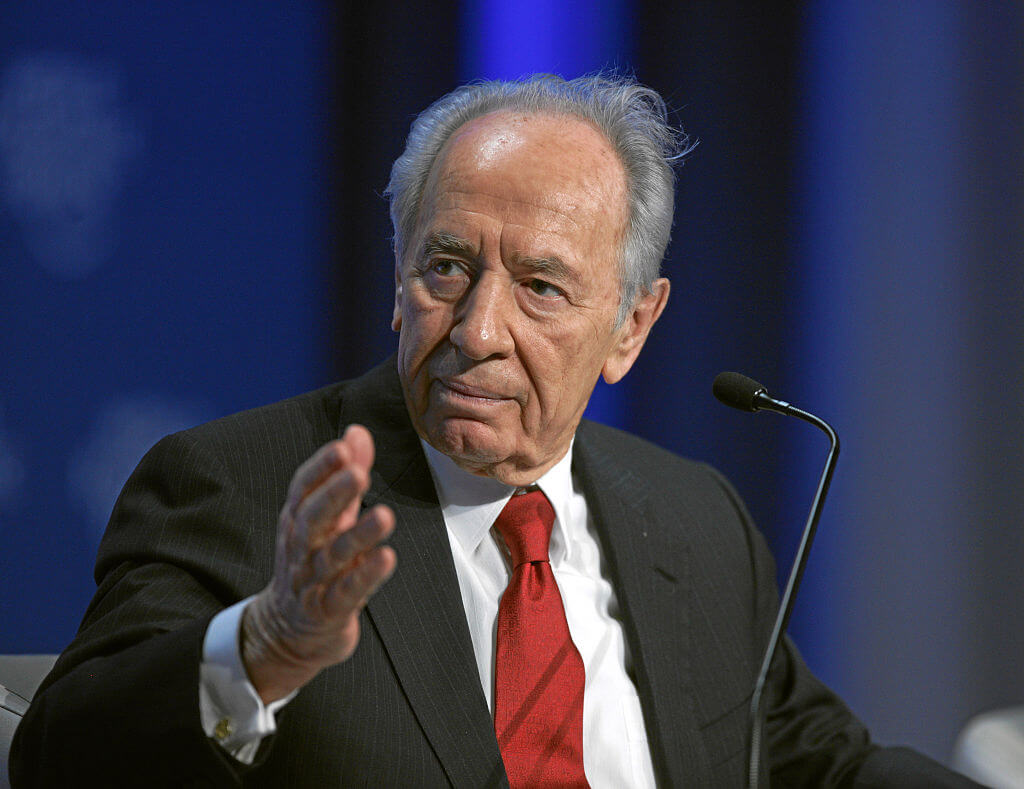
Shimon Peres talks Gaza at the 2009 World Economic Forum. Image: World Economic Forum
There is a special kind of amnesia reserved for the solemn occasion of a statesman’s death.
So it is with Shimon Peres, the consummate Israeli politician, would-be Prime Minister and sometime fig-leaf to Ariel Sharon, who – as his contemporary Uri Avnery writes – was ‘a politician from childhood on – a real politician, a complete politician, a politician and nothing else’.
The public epithets that have attached to his name in the last 48 hours have almost uniformly celebrated him as, to quote Prime Minister Turnbull on the subject, a ‘tireless advocate for peace’. Our own politicians in Australia, as elsewhere, seem deeply invested in the image of an Israeli politician and Nobel Prize laureate who, as per Turnbull’s tribute, was ‘staunchly committed to the belief that Israelis and Palestinians could live side-by-side, in peace and security’. It is at these times that certain information circulates and gains a life beyond itself, actualised in repetitions of the assertion with little heed to the referent it describes.
This is fitting for a man like Peres, who survived seven decades of politics in a place so closely watched for the state of its politics through his ingenious capacity to re-invent. So expert was Peres at the art of re-invention that the material facts of his life and political influence are almost totally obscured at the moment of his death. Such facts would anyway obstruct the Tweet-sized tributes that have transformed him into the sort of figure a settler-colonial nation state like Australia can really get behind.
Like the face that he altered with plastic surgery, Peres was a political chameleon. Or, as Avnery notes, he had such a genius for impersonation that ‘the image replaced the man’. It is tempting to conclude that Peres’ sins were those of a politician, with all the ethical murkiness and tendencies to pragmatism that this implies. But that would be a mistake. Peres has surely left a legacy but it is not the one that is currently flooding the media channels.
It is an irony of the current state of amnesia that Turnbull’s celebration of Peres as an adherent to a robust two-state solution elides the extraordinary reality that it was in fact Shimon Peres who instigated building of the first settlement in the Occupied West Bank after the Six-Day War. It is precisely the proliferation of these settlements throughout the Territories today that even conservative Zionist commentators like Peter Beinart agree present not only one of the major obstacles to peace, but threaten the very existence of the State of Israel in its current configuration.
Seemingly Peres’ part in the Nobel Peace Prize he was co-awarded in 1994 in recognition of the seriously inadequate and ultimately failed blueprints for Palestinian governance in the Oslo Accords has replaced this and other equally dark chapters of his past in public memory. And yet, even Peres’ stake in the Prize is not without its taint. As such, it is instructive in capturing the measure of this celebrated statesman. In the first place, his award was to the exclusion of his Palestinian counterpart Mahmoud Abbas (regulations cap the award recipients to three). Notwithstanding this obvious diplomatic iniquity, he campaigned tirelessly for his own inclusion. In fact, the allocation of the award itself is perhaps summative of the sort of balance we see replicated over and again when it comes to Israel/Palestine.
What has been suppressed, however, is the publicly expressed regret by members of the Nobel Prize committee about Peres’ award. Noting that within the statutes of the Nobel Foundation it is not possible to rescind an award, some eight years later, during Israel’s massive military assault of the West Bank in 2002 – Operation Defensive Shield – members of the Nobel Prize committee stated their regret that Peres could not be stripped of his prize. They explained: ‘as a member of the Israeli cabinet, he had not acted to prevent Israel’s re-occupation of Palestinian territory’.
And although it took eight years for this regret to be realised, Operation Defensive Shield was not the only controversial military attack Peres was involved in. Acting in the role of Prime Minister after the assassination of Yitzhak Rabin (his second turn as Acting Prime Minister, though he was never to win that office outright notwithstanding the rotation arrangement in the Alignment government of the 1980s in which he shared the role with Yitzhak Shamir), Peres authorised the 1996 aerial assaults on a UN refugee camp in the south Lebanon village of Qana.
With a death toll of 106 – half of this number children – and 116 others injured, this 17-minute strike – essentially a slaughter from the air – would foreshadow the kinds of tactics seen in the 21st century in Gaza. It was said that the Qana attack was apparently an attempt to boost Peres’ popularity for impending elections (an unlosable election according to Avnery, which nevertheless Peres lost). Yet seven decades of state-sanctioned criminality have, at his death, earned Peres the title of peacemaker rather than the notoriety of a war criminal.
Yes, Peres has left a legacy. His legacy is that of the dispossession of the Palestinian people. His legacy is in the architecture of ethnic cleansing, in the expansionism of Israeli settlements in service of a Greater Israel and in never acting to prevent Israel’s Occupation and Re-occupation of Palestine in his lifetime notwithstanding the hypocrisy of a prestigious award that makes claims to the contrary.
Legacies are important – they are inheritances and they are lessons. In remembering Peres, let us not forget what his legacy really is.
By Micaela Sahhar
